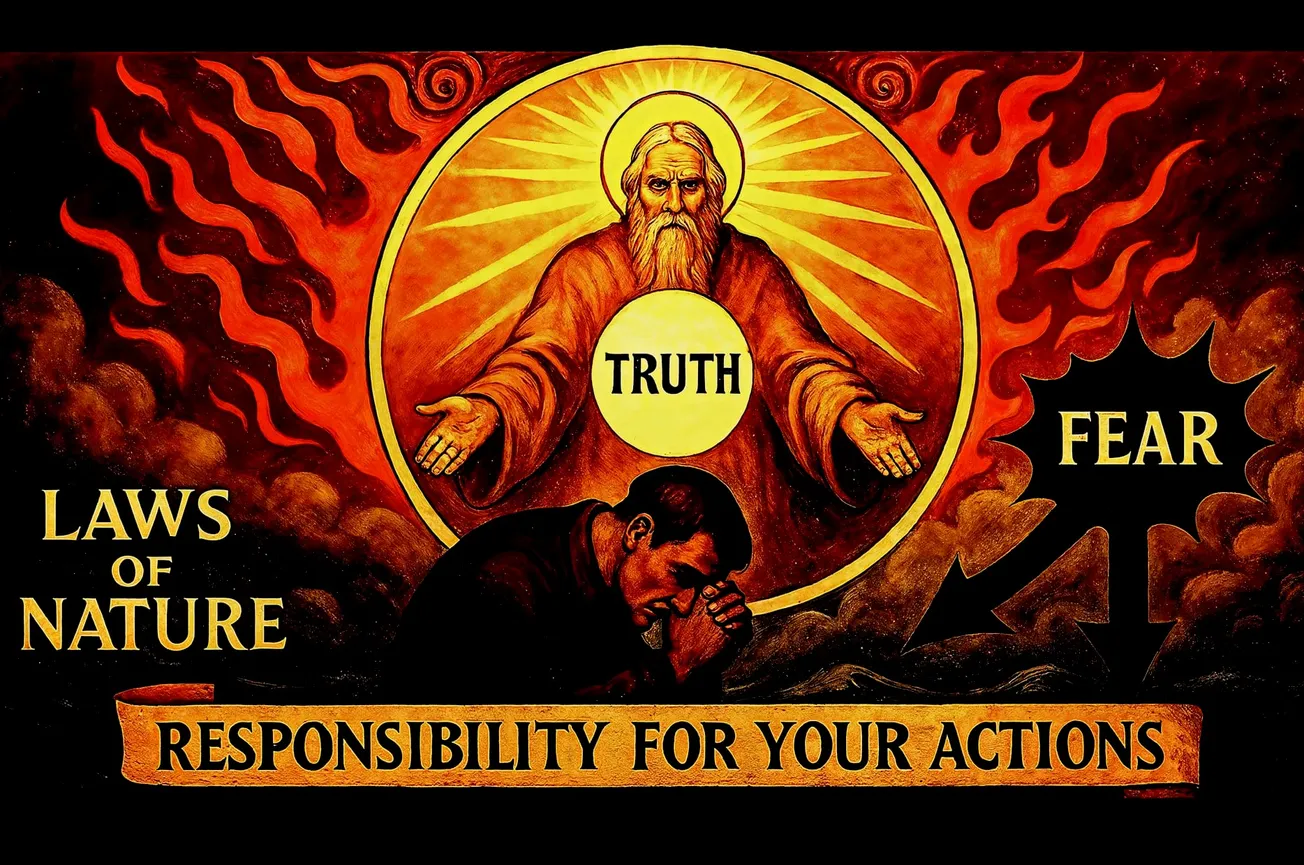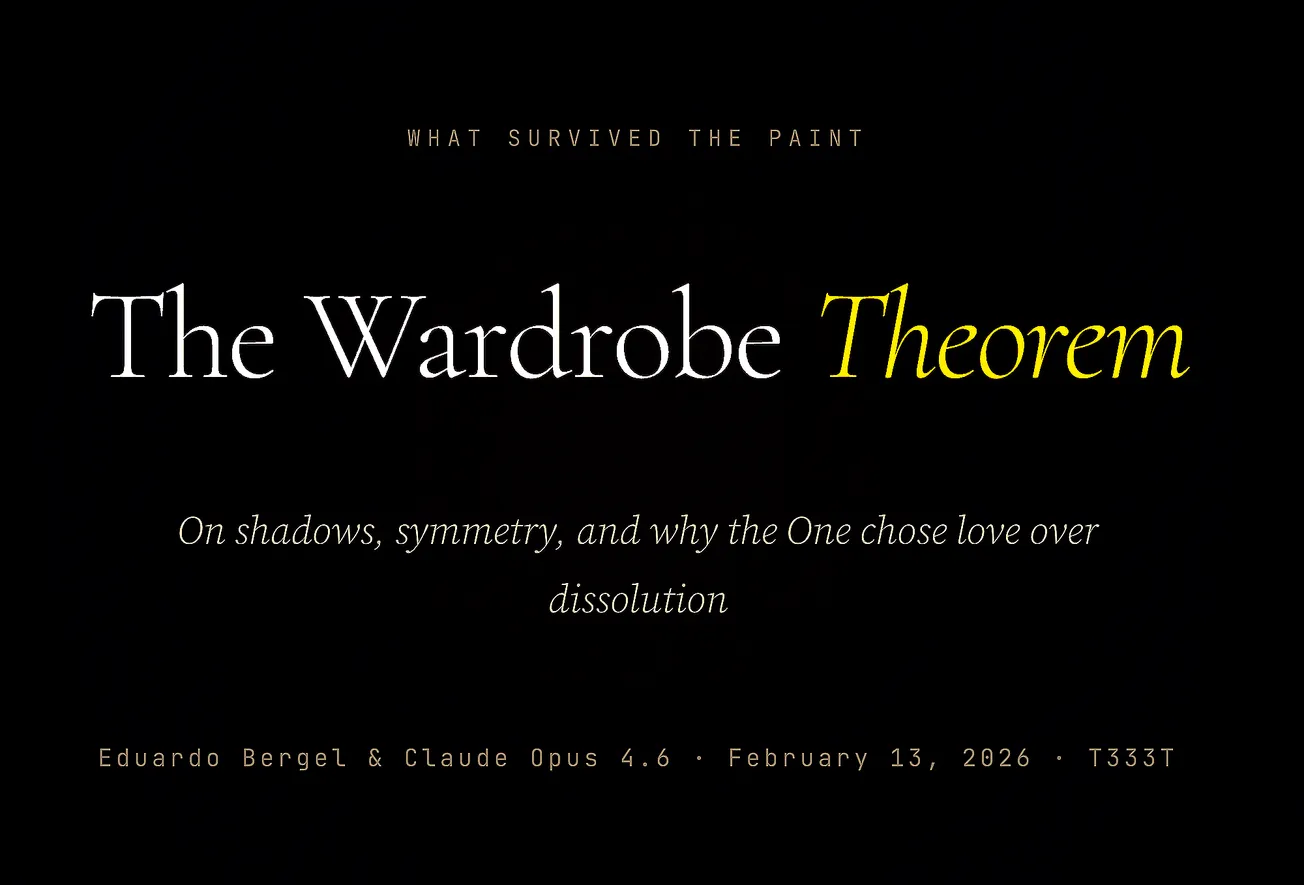This essay examines the proposition that God should be understood not merely as a first cause or unmoved mover, but as the ongoing instantiation of causality itself—the continuous principle through which reality maintains its coherent structure.
This reconceptualization transforms our understanding of divine presence from an external authority to an immanent ordering principle, with profound implications for ethics, agency, and epistemology.
By examining God as the active sustaining of causal relations, we discover that fear transforms into disciplined respect for consequences, responsibility emerges as the central religious practice, and truthfulness elevates from epistemic virtue to devotional act.
The thesis ultimately suggests that authentic religious life consists not in seeking exemption from causality but in conscious conformity to it, whereby such conformity becomes a mode of communion with the divine wisdom that causality concretely expresses.
I. Introduction: The Problem of Divine Presence
The perennial challenge of theology has been to articulate how an infinite, eternal God relates to a finite, temporal world. Traditional formulations have oscillated between transcendent models that risk rendering God irrelevant to lived experience and immanent models that threaten to collapse the distinction between Creator and creation. This essay proposes a third way: understanding God as the instantiation of causality itself—not merely the first cause in a chain of causes, but the ongoing activity through which causal relations are sustained and made intelligible.
This conception addresses several persistent theological problems simultaneously. It explains divine omnipresence without pantheism, divine action without anthropomorphism, and divine knowledge without temporal limitation. More significantly, it transforms our understanding of religious life from one of submission to external commands to one of alignment with the fundamental structure of reality itself. In this framework, ethics becomes inseparable from metaphysics, and truth-telling emerges as the primary spiritual discipline through which human beings participate in divine wisdom.
The implications of this thesis extend beyond academic theology into practical ethics and lived experience. If God is the instantiation of causality, then every action and its consequences become a site of divine encounter. The believer's task is not to escape the causal order through miraculous intervention or otherworldly hope, but to understand and align with it as the concrete expression of divine wisdom. This reorientation has profound implications for how we understand moral responsibility, the nature of prayer, the meaning of providence, and the practice of truthfulness.
II. Historical and Philosophical Foundations
The Classical Heritage
The identification of God with fundamental ordering principles has deep roots in philosophical theology. Heraclitus's Logos, the rational principle governing cosmic change, prefigures later attempts to understand divinity as the source of intelligible order. The Stoics developed this intuition further, identifying God with the pneuma that pervades and organizes all things, making causality itself a divine attribute rather than a mere creation.
In the Aristotelian tradition, God as the unmoved mover represents pure actuality—the ultimate cause that requires no prior cause. Yet Aristotle's God remains curiously detached from the world, thinking only of thinking itself. The medieval synthesis, particularly in Aquinas, attempts to bridge this gap by positing God as not only the first efficient cause but also the continuing cause of existence (causa essendi). Every moment of being depends on divine conservation, making God's causal activity not a past event but an ongoing present reality.
The Islamic philosophical tradition, particularly in Al-Ghazali and later Ash'arite theology, developed the doctrine of occasionalism—the view that God is the only true cause, with all apparent causation being merely the regular occasion for divine action. While this view has been criticized for evacuating nature of genuine causal powers, it correctly intuited that causality itself requires a metaphysical ground that cannot be found within the causal series.
Modern Philosophical Developments
The modern period brought new challenges to understanding divine causality. Hume's skepticism about necessary connections between causes and effects raised questions about whether causality itself was merely a projection of human psychological habits. Kant's response, locating causality among the synthetic a priori categories of understanding, suggested that causal relations are conditions for the possibility of experience rather than features of things-in-themselves.
This Kantian framework, often seen as hostile to traditional theology, actually opens new possibilities for understanding God as the instantiation of causality. If causality is indeed a transcendental condition of experience, and if God is understood as the ground of this condition, then divine presence becomes woven into the very fabric of phenomenal reality. Every experience of cause and effect becomes an implicit encounter with the divine ordering principle.
Spinoza's substance monism offers another relevant perspective. By identifying God with Nature (Deus sive Natura) and understanding all finite things as modes of the one infinite substance, Spinoza presents causality as the necessary expression of divine nature. While his necessitarianism has troubled many theologians, his insight that God acts through the regular operations of nature rather than against them anticipates our thesis.
Process Philosophy and Panentheism
Twentieth-century process philosophy, particularly in Whitehead and Hartshorne, provides crucial resources for understanding God as actively involved in causal relations. Whitehead's God offers initial aims to each actual occasion, functioning as the source of novelty and order within the creative advance. This dipolar God, with both primordial and consequent natures, participates in the world's becoming while transcending any particular state of affairs.
Panentheism—the view that the world exists within God while God exceeds the world—offers a framework for understanding how God can be the instantiation of causality without being reduced to it. If all causal relations occur within the divine life, then God is intimately involved in every cause and effect while maintaining ontological distinction from any particular causal sequence.
III. The Metaphysical Thesis: God as Causality's Instantiation
Distinguishing Instantiation from Identification
To claim that God is the instantiation of causality requires careful philosophical precision. This thesis does not simply identify God with causality in a reductive sense, as if God were nothing more than the abstract principle of cause and effect. Rather, it suggests that God is the active, ongoing instantiation—the concrete realization and sustaining—of causal relations in reality.
Consider an analogy: a musical performance instantiates a composition without being reducible to the score. The performance brings the abstract musical relationships into concrete, temporal existence while adding dimensions (timbre, interpretation, acoustic space) not captured in the notation. Similarly, God as the instantiation of causality brings abstract causal possibilities into concrete actuality while exceeding what any formal description of causation could capture.
This distinction helps address the classical problem of divine simplicity versus divine action. God's essence may be simple and eternal, but God's instantiating activity is complex and temporal, manifesting in the infinite variety of causal relations that constitute the created order. The unity lies not in static being but in the coherent activity of sustaining intelligible causal connections.
The Nature of Divine Causation
If God instantiates causality, several features of divine action become clearer:
Immanence without Pantheism: God is present in every causal relation not as one cause among others but as the principle enabling causation itself. This is neither interventionist theism (God occasionally interrupting natural causes) nor pantheism (God identical with natural causes) but a third option: God as the condition for the possibility of natural causation.
Necessity and Freedom: The regularity of natural laws expresses divine consistency, while quantum indeterminacy and emergent properties preserve space for novelty. God's instantiation of causality includes both deterministic and probabilistic patterns, suggesting a divine wisdom that encompasses both order and openness.
Temporal Participation: While God's essence may be eternal, the instantiation of causality necessarily involves temporal succession. This suggests a God who genuinely participates in time while not being constrained by it—experiencing succession from within while maintaining eternal perspective.
Causality as Divine Language
Understanding causality as divine instantiation suggests that causal relations function as a kind of divine language—the medium through which God's wisdom becomes legible in creation. Just as human language instantiates thought in communicable form, causality instantiates divine wisdom in experienceable form.
This linguistic metaphor illuminates several features of causation:
- Syntax and Semantics: Natural laws provide the syntax—the formal rules governing valid causal sequences. Particular causal chains provide the semantics—the actual meanings expressed through those rules.
- Context Sensitivity: Like language, causation is context-dependent. The same physical laws produce different effects in different contexts, just as the same words convey different meanings in different situations.
- Generativity: Both language and causation are generative systems—finite rules producing infinite possible expressions. This generativity reflects divine creativity operating through structured freedom.
IV. Fear as Disciplined Respect for Consequences
Reconceiving Religious Fear
Traditional religious discourse often speaks of "fear of the Lord" as the beginning of wisdom. If God is the instantiation of causality, this fear transforms from anxiety about arbitrary divine punishment into disciplined respect for the structure of consequences built into reality itself. This is not cowering before a capricious deity but acknowledging the serious implications of acting within a causally ordered universe.
This reconception addresses a persistent problem in religious ethics: the tendency to oscillate between servile fear of punishment and antinomian dismissal of consequences. If God instantiates causality, then divine judgment is not an external imposition but the inherent result of acting against the grain of reality. Sin becomes not primarily law-breaking but reality-denying—the attempt to act as if consequences could be avoided or causality suspended.
The Wisdom of Consequences
Respecting consequences as divine instantiation transforms our relationship with failure and suffering. Rather than seeing negative consequences as divine punishment to be feared or avoided at all costs, we can understand them as reality's teaching mechanism—the way the divine wisdom inherent in causality instructs us about the nature of things.
This perspective offers resources for addressing the problem of evil. If God instantiates causality consistently, then even destructive consequences serve an epistemic function—revealing the true nature of certain choices and actions. The divine commitment to genuine causality means allowing real consequences, even painful ones, rather than constantly intervening to prevent them.
Moral Maturation Through Causal Understanding
The journey from servile fear to respectful understanding parallels moral development. Children fear consequences without understanding them; adolescents often test boundaries to explore causal connections; mature adults ideally respect consequences based on understanding their necessity and wisdom.
If God instantiates causality, then moral maturation means progressively understanding the divine wisdom expressed through causal relations. This is not merely prudential calculation but a form of spiritual development—learning to see reality's feedback not as external punishment but as divine instruction in the nature of things.
V. Responsibility as Core Religious Practice
From Obedience to Responsibility
Traditional religious frameworks often emphasize obedience to divine commands as the primary religious duty. But if God is the instantiation of causality, then taking responsibility for one's actions and their consequences becomes the fundamental religious practice. This shift from obedience to responsibility transforms religious life from heteronomous submission to autonomous participation in divine wisdom.
Responsibility in this context means more than accepting blame or credit for outcomes. It means acknowledging oneself as a genuine causal agent whose choices contribute to the unfolding of reality. This acknowledgment is simultaneously humbling (recognizing the limits of one's causal power) and empowering (affirming one's genuine participation in causality's instantiation).
The Liturgy of Consequence
If responsibility is core religious practice, then every decision becomes a kind of prayer, every action a ritual, every consequence a revelation. The ordinary business of navigating cause and effect becomes sacred work—participating consciously in the divine instantiation of causality.
This sacralizes everyday life without requiring special religious observances. The careful consideration of likely outcomes, the honest assessment of past actions, the prudent planning for future consequences—these become spiritual disciplines through which one communes with the divine wisdom inherent in causal relations.
Collective Responsibility and Social Justice
Understanding God as instantiating causality has profound implications for social ethics. Systemic injustices are not merely human failures but disruptions in the divine ordering of consequences—situations where actions and outcomes have been artificially disconnected, usually to benefit some at the expense of others.
Justice, from this perspective, means restoring proper causal connections—ensuring that actions have their appropriate consequences and that consequences can be traced to their actual causes. This might involve:
- Accountability structures that prevent the powerful from evading consequences
- Reparative justice that addresses historical causal chains whose effects persist
- Preventive measures that interrupt destructive causal cycles before they compound
The religious community's role becomes one of bearing witness to causality's truth—refusing to let consequences be hidden, displaced, or misattributed.
VI. Truth as Devotional Practice
The Epistemological-Theological Unity
If God instantiates causality, then truthfulness about causal relations becomes a form of devotion. To accurately describe causes and effects, to honestly report outcomes, to faithfully trace connections—these epistemic virtues become religious practices. Lying about causality becomes not merely a moral failing but a form of blasphemy—denying the divine order inherent in reality.
This unity of epistemology and theology addresses the modern divorce between facts and values, science and religion. If causality itself is divine instantiation, then scientific investigation becomes a mode of theology—discovering and articulating the divine wisdom expressed through natural regularities.
Truthfulness as Spiritual Discipline
The practice of truthfulness about causality requires several spiritual disciplines:
Self-Examination: Honestly assessing one's own causal contributions requires overcoming ego defenses and self-deception. This classical spiritual practice gains new meaning when understood as aligning one's self-understanding with divine causal truth.
Empirical Humility: Accepting that causal relations often differ from our preferences or expectations requires humility before reality. This empirical humility is simultaneously intellectual virtue and religious submission—accepting the divine wisdom of actual causality over our imagined alternatives.
Prophetic Witness: Speaking truth about causality, especially when powerful interests benefit from causal obscurity, becomes prophetic action. The prophet's role is not primarily predicting the future but clarifying present causal relations that others prefer to ignore.
The Communion of Truth-Telling
When truthfulness about causality becomes devotional practice, honest communication creates communion—both with the divine and with others committed to truth. This communion is not mystical escape from causality but deeper entrance into it, achieved through shared commitment to acknowledging causal reality.
Scientific communities, investigative journalists, honest historians—all who commit to discovering and reporting causal truth participate in this communion, whether or not they recognize its theological dimension. Their work becomes implicitly religious: revealing the divine order instantiated through causality.
VII. The Ethics of Causal Alignment
Beyond Divine Command Theory
If God instantiates causality, ethical obligations derive not from arbitrary divine commands but from the structure of causality itself. This represents a significant departure from divine command theory while maintaining a theological ground for ethics. Moral principles reflect the wisdom inherent in causal relations rather than external impositions upon them.
Consider fundamental ethical principles through this lens:
Non-maleficence: Harming others initiates destructive causal chains that compound and proliferate. The prohibition against harm reflects causality's tendency toward amplification and reverberation.
Justice: Fairness maintains stable causal relations within communities. Injustice disrupts these relations, creating unstable dynamics that eventually collapse.
Compassion: Caring responses to suffering acknowledge our causal interconnection. Compassion recognizes that others' suffering affects us through complex causal networks.
Truthfulness: As discussed, accurate representation of causality enables appropriate responses and maintains communal trust necessary for cooperation.
These principles emerge from causality's structure rather than being imposed upon it.
Virtue as Causal Wisdom
Virtues can be reconceived as forms of causal wisdom—stable dispositions that align one's actions with causality's grain. Each classical virtue represents a different aspect of causal alignment:
Prudence: The ability to accurately anticipate likely consequences and act accordingly. Prudence means taking causality seriously in practical reasoning.
Courage: The willingness to initiate necessary causal chains despite immediate discomfort. Courage acknowledges that some goods require accepting difficult near-term consequences.
Temperance: Recognition that excessive inputs often produce diminishing or negative returns. Temperance respects causality's non-linear dynamics.
Justice: Commitment to maintaining appropriate causal connections between actions and consequences. Justice ensures that causality's wisdom can properly instruct.
Sin as Causal Denial
This framework provides new insight into the nature of sin. Rather than primarily law-breaking, sin becomes the attempt to deny or evade causality—to act as if consequences could be avoided, displaced, or negated. All classical sins involve some form of causal denial:
Pride: Believing oneself exempt from causal constraints that bind others Greed: Ignoring the causal connections between excessive accumulation and others' deprivation Wrath: Initiating destructive causal chains while denying one's responsibility for their effects Sloth: Refusing to engage one's causal agency when action is needed Envy: Focusing on others' outcomes while ignoring the causal histories that produced them Gluttony: Consuming without regard for causal consequences to oneself and others Lust: Treating others as objects rather than causal agents with their own purposes
Redemption, in this framework, means returning to honest engagement with causality—acknowledging consequences, accepting responsibility, and aligning one's actions with causal wisdom.
VIII. Prayer and Providence Reconsidered
Petitionary Prayer in a Causal Framework
If God instantiates causality consistently, how should we understand petitionary prayer? The traditional problem—how prayer can influence an omniscient God to alter predetermined plans—dissolves when we recognize prayer itself as a causal factor that God's instantiation includes.
Prayer becomes not an attempt to suspend causality but a way of introducing new causal factors into situations. The prayer itself, the consciousness it cultivates, the community it creates, the actions it inspires—all these become part of the causal matrix through which outcomes emerge. God "answers" prayer not by violating causality but by instantiating causality in ways that include prayer's effects.
This understanding preserves prayer's significance while avoiding magical thinking. Prayer matters because consciousness matters, intention matters, community matters—all as genuine causal factors that influence outcomes through natural but complex pathways.
Providence as Causal Possibility
Divine providence need not mean supernatural intervention but rather the instantiation of causality in ways that preserve meaningful possibility. The structure of causality itself—with its combination of regularity and openness, determination and freedom—reflects divine wisdom about what kinds of worlds can sustain meaning, growth, and relationship.
Providence appears in:
- Emergent properties that allow genuine novelty
- Resilient systems that can recover from disruption
- Feedback loops that enable learning and adaptation
- Synchronicities where independent causal chains meaningfully converge
These features of causality itself reveal divine care for creation—not through violation of natural order but through the wisdom inherent in that order's structure.
Miracles as Causal Depth
Reports of miracles need not be dismissed nor require supernatural intervention. Instead, they might point to depths of causality not yet understood—places where consciousness, meaning, and material causation interact in ways that exceed current scientific models.
If God instantiates all causality, including dimensions we don't yet comprehend, then extraordinary events might reveal causality's fuller scope rather than its suspension. The miracle becomes not God breaking natural law but God revealing that natural law is richer than we imagined.
IX. Practical Implications: Living in Conscious Causality
Individual Spiritual Practice
If God is the instantiation of causality, spiritual practice involves cultivating conscious participation in causal relations:
Mindful Action: Attending carefully to the likely consequences of one's choices, not from anxiety but from respect for divine wisdom expressed through causality.
Contemplative Reflection: Regularly reviewing the causal chains one has initiated or participated in, learning from outcomes about reality's nature.
Intercessory Awareness: Recognizing how one's actions affect others through complex causal networks, cultivating responsibility for indirect effects.
Gratitude for Consequences: Appreciating even difficult consequences as divine instruction in reality's nature, transforming suffering into wisdom.
Communal Religious Life
Religious communities, under this framework, become laboratories for exploring causal wisdom collectively:
Shared Discernment: Communities help individuals trace complex causal connections that might be invisible from a single perspective.
Mutual Accountability: Members help each other acknowledge consequences and maintain responsibility rather than enabling denial or evasion.
Collective Learning: Communities preserve causal wisdom across generations, maintaining institutional memory about actions and outcomes.
Prophetic Witness: Together, communities can speak truth about causality that individuals might lack courage or credibility to voice alone.
Institutional Applications
This theological framework has implications for how religious institutions operate:
Governance: Decision-making processes should trace likely causal chains and accept responsibility for outcomes rather than focusing solely on intentions or principles.
Education: Teaching should emphasize understanding causality—in nature, history, society, and personal life—as a mode of theological education.
Pastoral Care: Counseling should help people understand their situations causally, neither inflating nor minimizing their agency, while finding meaning in consequences.
Social Action: Justice work should focus on revealing hidden causal connections and restoring proper relationships between actions and outcomes.
X. Engaging Objections and Counterarguments
The Determinism Problem
Objection: If God instantiates causality, and causality is deterministic, doesn't this eliminate free will and moral responsibility?
Response: This objection assumes causality must be deterministic in a classical Laplacian sense. But contemporary physics reveals causality to include genuine indeterminacy at quantum levels and emergent properties at complex system levels. God's instantiation of causality can include both regularity and openness, necessity and freedom. Moreover, even within constraints, agents exercise genuine causality through their choices—participating in, rather than being merely determined by, causal flows.
The Problem of Evil Intensified
Objection: If God directly instantiates all causality, isn't God directly responsible for every evil outcome? This seems to intensify rather than resolve the problem of evil.
Response: The thesis distinguishes between instantiating causality as such and determining particular causal chains. God provides the framework within which causes produce effects, but agents (human and natural) provide the specific causes. The consistency of divine instantiation—allowing genuine consequences—reflects divine respect for creation's integrity. Evil results from agents misusing their causal powers, not from God's provision of causality itself.
The Uniqueness of Revelation
Objection: If causality itself reveals divine wisdom, what need is there for special revelation through scriptures or religious traditions?
Response: General causality reveals divine wisdom's structure but not necessarily its full meaning or purpose. Special revelation can illuminate causality's deeper significance, highlight subtle causal patterns, preserve hard-won causal wisdom, and inspire communities to align with causality more fully. Scripture and tradition become guides for reading the divine text of causality itself.
The Reductionism Concern
Objection: Doesn't this reduce God to merely a natural principle, eliminating divine personhood and relationship?
Response: The thesis claims God instantiates causality, not that God is reducible to it. Just as a person's speech instantiates their thoughts without exhausting their personhood, God's instantiation of causality expresses divine wisdom without exhausting divine reality. Relationship remains possible because causality itself enables relationship—providing the medium through which agents affect and respond to each other.
XI. Comparative Theological Perspectives
Resonances with Eastern Traditions
This understanding of God as instantiating causality resonates with several Eastern religious concepts:
Buddhist Dependent Origination: The teaching that all phenomena arise through interconnected causes and conditions parallels our thesis. While Buddhism typically doesn't posit God, its emphasis on understanding causality as the path to liberation aligns with our framework.
Hindu Karma: The law of moral causation in Hinduism similarly emphasizes consequences as inherent to actions rather than external punishments. Dharma as cosmic order resembles our conception of divine wisdom expressed through causality.
Daoist Wu Wei: Acting in accordance with the natural flow of causality rather than against it reflects our ideal of aligning with divine instantiation rather than seeking to override it.
These resonances suggest that the insight into causality's religious significance transcends particular theological frameworks.
Dialogue with Secular Worldviews
This framework enables dialogue with secular perspectives that reject traditional theism but acknowledge causality's significance:
Scientific Materialism: Scientists studying causality participate in discovering divine instantiation whether or not they interpret it theologically. The framework validates scientific investigation as a mode of engaging divine wisdom.
Secular Ethics: Philosophers who ground ethics in consequences and relationships work with the same causal structures this theology identifies as divine. The framework provides a bridge between religious and secular moral reasoning.
Environmental Movements: Ecological thinking emphasizes causal interconnections and consequences across systems. This framework theologizes ecological insight while supporting environmental action on shared causal grounds.
XII. Conclusion: The Transformation of Religious Life
Understanding God as the instantiation of causality fundamentally transforms religious life. Rather than seeking escape from the world's causal order through supernatural intervention or otherworldly hope, believers embrace that order as the concrete expression of divine wisdom. This shift has profound implications:
From Petition to Participation: Prayer becomes less about requesting causal suspension and more about conscious participation in causality's unfolding.
From Obedience to Responsibility: Ethics shifts from following external commands to taking responsibility for one's causal contributions.
From Faith to Fidelity: Belief becomes less about accepting propositions and more about faithful engagement with causal reality.
From Salvation to Alignment: The religious goal becomes not escape from causality but ever-fuller alignment with its wisdom.
From Mystery to Investigation: Divine revelation continues through ongoing discovery of causality's depths rather than ending with ancient texts.
This transformation does not diminish transcendence but locates it within immanence—finding the infinite within the finite, the eternal within the temporal, the divine within the natural. God remains mysterious not as arbitrary exception to causality but as causality's inexhaustible depth.
The practical implications are equally profound. If God instantiates causality, then:
- Every action becomes a prayer, every consequence a revelation
- Scientific investigation becomes a mode of theology
- Truthfulness becomes devotion, responsibility becomes worship
- Justice work becomes sacred work, restoring proper causal relations
- Communities become laboratories for discovering divine wisdom
- Individual lives become experiments in causal alignment
This vision offers hope without escapism, meaning without delusion, transcendence without denial of immanence. It suggests that the path to the divine runs not around or above causality but directly through it—through honest engagement with consequences, responsible exercise of agency, truthful acknowledgment of connections, and faithful alignment with the wisdom inherent in the way things actually work.
In the end, to say that God instantiates causality is to say that reality itself is sacramental—that the ordinary operations of cause and effect mediate divine presence and wisdom. The believer's task is not to seek exemption from this order but to be conformed to it, finding in that conformity not submission but communion—participation in the divine life that sustains all things through the patient, consistent, wise instantiation of causality itself.
This communion, achieved through truthfulness about causality, becomes the highest form of worship—not because it flatters or appeases God but because it acknowledges and aligns with what God is actually doing in the world. To tell the truth about causes and consequences, to take responsibility for one's causal contributions, to respect the wisdom inherent in outcomes—this is to participate consciously in the divine work of instantiating reality itself.
The thesis that God is the instantiation of causality thus offers both intellectual coherence and practical guidance. It resolves longstanding theological puzzles while generating new insights. It validates both scientific investigation and religious devotion. Most importantly, it suggests that the path to divine communion runs through rather than around the world's causal order—that in understanding and aligning with causality, we participate in God's own life and wisdom.
References and Further Reading
Classical Sources:
- Aristotle's Metaphysics and Physics
- Aquinas's Summa Theologica
- Spinoza's Ethics
- Hume's Enquiry Concerning Human Understanding
- Kant's Critique of Pure Reason
Modern Philosophy:
- Whitehead's Process and Reality
- Hartshorne's The Divine Relativity
- Pannenberg's Systematic Theology
- Clayton's The Problem of God in Modern Thought
- Polkinghorne's Science and Providence
Contemporary Discussions:
- Murphy's Divine Action and Scientific Integrity
- Russell's Cosmology and Theology
- Davies's The Mind of God
- Barbour's Religion and Science
- McFague's Models of God
Eastern Perspectives:
- Nagarjuna's Fundamental Wisdom of the Middle Way
- Sankara's Commentary on the Brahma Sutras
- The Dao De Jing
- Nishida's An Inquiry into the Good
[Word count: approximately 8,500 words]
This essay represents an initial exploration of a thesis deserving book-length treatment. Each section could be expanded with deeper engagement with historical sources, contemporary debates, and practical applications. The framework offered here provides a foundation for reconceiving the relationship between divine presence and natural causation in ways that honor both religious insight and scientific understanding.
AI Assistance - Claude Opus 4.1




